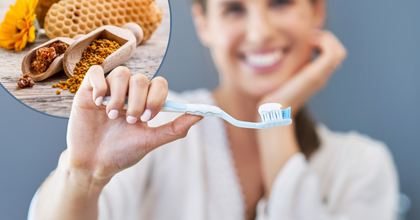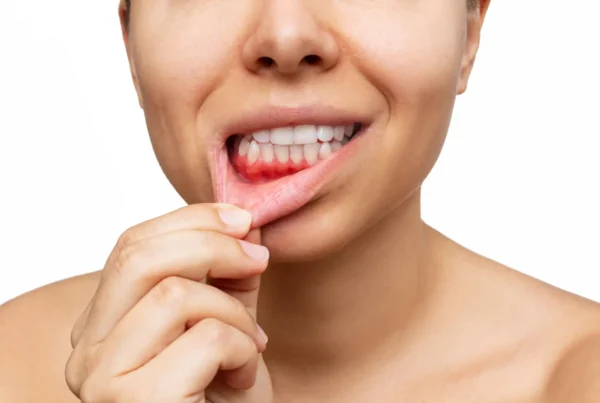- Why propolis is used in dental care
- Antibacterial action and cavity prevention
- Support for irritated or inflamed gums
- Antifungal and antiviral benefits of propolis
- Enamel protection and remineralization support
- Safety and considerations in daily use
- Whitening with propolis – is it worth it?
- Conclusion – natural toothpaste for healthier smiles
Why propolis is used in dental care
Propolis, often referred to as bee glue, is a natural substance produced by bees from plant resins. Its role in the hive is protective and sealing, but for centuries it has also been valued in traditional medicine. In the context of oral hygiene, propolis stands out due to its antibacterial, anti-inflammatory, antiviral and regenerative properties. These features make it a powerful ally in the fight against common dental issues such as cavities, gum inflammation or bad breath.
In modern formulations, propolis is increasingly used in natural toothpastes, especially those aimed at people with sensitive gums or those looking for fluoride-free options. It offers a natural yet effective alternative to chemical-based ingredients, while still maintaining high standards of oral care.
Antibacterial action and cavity prevention
One of the most well-documented benefits of propolis is its strong antibacterial effect. It targets harmful microorganisms in the mouth, particularly Streptococcus mutans, which plays a key role in tooth decay. By limiting the growth of such bacteria, propolis helps reduce plaque accumulation and slows down the formation of tartar.
Regular brushing with a toothpaste containing propolis can therefore support both the prevention of dental caries and the maintenance of a healthier oral environment. This natural defense mechanism is especially beneficial for individuals seeking to minimize the use of synthetic antibacterial agents.
Support for irritated or inflamed gums
Gum health is essential to overall oral well-being, and propolis offers real benefits in this area. Its anti-inflammatory components help soothe irritated tissues, making it useful in the management of conditions such as gingivitis. Moreover, it promotes healing in cases of micro-lesions or canker sores, often caused by mechanical irritation or underlying infection.
By reducing inflammation and encouraging tissue regeneration, propolis toothpaste can improve comfort and accelerate the recovery of the gum line. It is particularly helpful for individuals with a tendency toward gum sensitivity or bleeding during brushing.
Antifungal and antiviral benefits of propolis
In addition to its antibacterial properties, propolis also exhibits antifungal and antiviral activity. This broad-spectrum protection is vital for maintaining a balanced oral microbiome. Conditions such as oral candidiasis or viral gum infections can be minimized by the consistent use of propolis, which acts as a natural shield against opportunistic pathogens.
Its effectiveness in preventing microbial imbalance adds another layer of value to this unique ingredient, especially in daily preventive care.
Read more: Does turmeric whiten teeth and remove stains?
Enamel protection and remineralization support
Despite being the hardest substance in the human body, tooth enamel is susceptible to erosion, particularly from acidic byproducts of bacterial metabolism. Propolis plays a role in limiting this damage by neutralizing bacteria and helping maintain a healthier pH environment in the mouth.
Additionally, its mild cleansing and polishing properties assist in removing deposits without being abrasive, which contributes to the long-term integrity of enamel. For people who want to protect their teeth naturally, propolis can be a valuable part of a comprehensive oral care routine.
Safety and considerations in daily use
Propolis is generally well tolerated by most users, although individuals allergic to bee products should be cautious. Natural toothpastes with propolis are often free from fluoride, sodium lauryl sulfate (SLS), parabens and artificial colorants, making them suitable even for children over six years of age and for people with chemical sensitivities.
When choosing a propolis-based product, it’s important to verify the ingredient list and ensure it meets individual needs, especially in the case of allergies or specific dental conditions.
Whitening with propolis – is it worth it?
A popular example of a whitening toothpaste with propolis is the fluoride-free formula from Mr. Bright. This bio toothpaste contains menthol, xylitol, sorbitol, PEG-8, glycerin and hydrated silica – all ingredients that contribute to a fresh feeling and gentle stain removal without being harsh on the enamel.
Thanks to its mild composition and natural approach, this type of toothpaste can be used twice daily to promote both whitening and oral protection. For those looking for a cleaner, greener option in dental hygiene, propolis offers an effective and safe alternative.
Conclusion – natural toothpaste for healthier smiles
Toothpaste with propolis is more than just a natural trend. It’s a scientifically supported choice that offers real oral health benefits. From antibacterial and anti-inflammatory effects to antiviral and antifungal support, propolis addresses a wide range of needs in daily dental care.
Whether you’re dealing with gum sensitivity, plaque buildup, or simply want to transition to a fluoride-free alternative, a propolis-based toothpaste can be a valuable addition to your routine. It promotes a cleaner, healthier mouth while aligning with the growing demand for safe, plant-based ingredients in modern oral hygiene.






